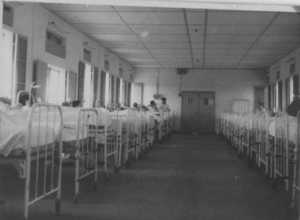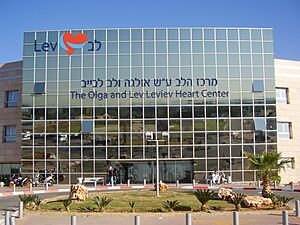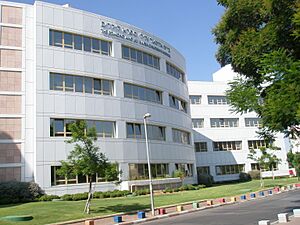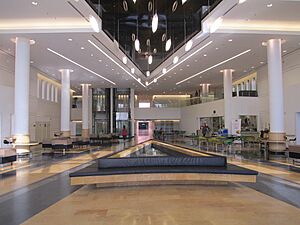Sheba Medical Center facts for kids
Quick facts for kids Sheba Medical Center |
|
|---|---|
 |
|
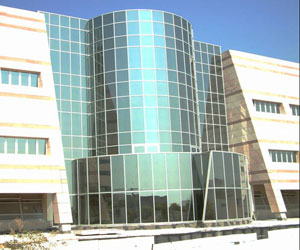 |
|
| Geography | |
| Location | Tel HaShomer, Ramat Gan, Tel Aviv District, Israel |
| Coordinates | 32°2′49.75″N 34°50′42.41″E / 32.0471528°N 34.8451139°E |
| Organisation | |
| Affiliated university | Tel Aviv University |
| Services | |
| Emergency department | Yes |
| Helipad | yes |
| Beds | 1,580 |
| History | |
| Founded | 1948 |
The Chaim Sheba Medical Center at Tel HaShomer is often called Tel HaShomer Hospital. It is the largest hospital in Israel. You can find it in the Tel HaShomer area of Ramat Gan, a city in the Tel Aviv District.
In 2025, Newsweek magazine said it was the 8th best hospital in the world. It was the top-ranked hospital from Asia or Israel on their list.
Contents
A Look Back: Sheba's History
This hospital started in 1948. It was Israel's first military hospital. Its job was to help soldiers injured in the 1948 Arab–Israeli War. It was built using old army buildings from when the British ruled the area.
At first, it was called Army Hospital No. 5. Later, Israel's Prime Minister, David Ben-Gurion, changed its name to Tel HaShomer Hospital. In 1953, it became a hospital for everyone, not just soldiers. Dr. Chaim Sheba became its director. After he passed away, the hospital was named in his honor.
What Sheba Medical Center Is Like Today
Sheba Medical Center is very large. It sits on a campus that is about 800 acres big. The hospital has 120 different departments and clinics. It has 1,430 beds for patients.
About 1,250 doctors work there. There are also 2,300 nurses and 1,500 other healthcare workers. Plus, 1,700 other staff members help run the hospital. Nearly 1,000 volunteers, researchers, and foreign interns also work there.
More than 1,000,000 patients visit Sheba each year. About 200,000 of these visits are for emergencies. The hospital performs over two million medical tests every year. People from all over the world help support Sheba with donations.
Special Centers at Sheba
Sheba Medical Center is more than just a regular hospital. It has many special parts:
- An acute care hospital for serious illnesses.
- A rehabilitation hospital, which is one of the biggest in the world. It helps people recover after injuries or illnesses.
- Hospitals just for women and children.
- Clinics for specific needs, like eating disorders or PTSD for soldiers.
- A large laboratory and outpatient clinics.
- An academic campus where medical students learn.
Sheba is also home to important national centers. These include the Israel National Center for Health Policy and Epidemiology Research. This center is like the U.S. National Institutes of Health. There's also the Israel National Center for Medical Simulation (MSR). This is where doctors practice medical procedures.
The Israel National Blood Bank and Cord Blood Bank are also at Sheba. They store blood and cord blood for medical use. The Safra International Congenital Heart Center helps children with heart problems. Other big centers include the Sheba Cancer Treatment and Research Centers. The Sheba Heart Center was given a gift by Lev Leviev. There is even a hotel, the Shilev Hotel, for patients who are recovering.
Helping People Around the World
Sheba helps patients from all over the Middle East. This includes many children from the Palestinian Authority. The hospital also helps other countries build and run their own healthcare systems.
Sheba has helped set up clinics and medical centers in many places. These include Ukraine, Uzbekistan, Equatorial Guinea, Mauritania, and the Ivory Coast. Sheba has also sent medical teams to help in emergencies. They went to Kosovo, Armenia, Cambodia, Sri Lanka, and Rwanda.
After a big explosion in Equatorial Guinea, Sheba sent a relief team. They also helped eight Kurdish babies who needed heart surgery in Israel. In 2020, Sheba sent a team to help with the coronavirus in Italy. They also sent equipment and experts to Uruguay. In 2021, the United Arab Emirates (UAE) and Sheba agreed to work together. They want to make healthcare better for everyone.
Medical Discoveries: Clinical Research
Sheba Medical Center is a major place for medical research in Israel. Many scientific studies are done here. These studies often work with universities like the Weizmann Institute of Science and Tel Aviv University.
In 2011, Sheba earned the most money from research among Israeli hospitals. This shows how much important research they do.
What Kind of Research Happens at Sheba?
Scientists at Sheba study many different things. For example, they looked at pregnancy after a special treatment for women. They also studied a new material that might help repair heart tissue after a heart attack. Another study found that people who use cell phones a lot might have a higher risk of certain tumors.
An Israeli company called Ventor Technologies created a new heart valve at Sheba. This valve can be put in with a small tube, not open-heart surgery. This invention was sold to a big medical company in 2009. In 2020, the hospital tested a fast coronavirus test. It could give results in just two to 15 minutes.
New Research Projects
Sheba Medical Center is always working on new research. They want to improve how they care for patients.
- Heart Health: Sheba's heart doctors do many studies. They look at new ways to treat heart failure and other heart problems.
- Cancer Care: The cancer department is very active in research. They try out new treatments for cancer.
- Smart Technology (AI): Sheba researchers used Artificial Intelligence (AI) in a study. AI helped them guess if someone in the emergency room might have a serious lung problem. This helps doctors treat patients faster.
- Using Data to Help: The hospital has a special center called ADAMS. It uses computer programs to look at patient information. This helps doctors make better decisions.
Edmond and Lily Safra Children’s Hospital
The Edmond and Lily Safra Children's Hospital opened in 2002. It was built with help from the Edmond J. Safra Foundation. This hospital offers many services for children. They can get tests and treatments for many different health issues.
The hospital has special units for tiny babies and for very sick children. There are also units for cancer and blood disorders. They treat children from Israel, the nearby Palestinian Authority, and other parts of the Middle East. More than 60,000 children visit this hospital every year. The hospital also helped children who were released after a difficult event in October 2023. They were ready to give immediate care.
The Children's Hospital also does medical research. Sheba wants to help children in every way. They care for their bodies, feelings, and social needs. Besides medical care, the hospital has playrooms and classrooms. There are also kitchens and places for visitors. Patient rooms are set up so parents can stay with their children.
Treating Childhood Cancers
The Pediatric Hemato-Oncology Department at Sheba is a special place. It treats cancers and blood problems in children. About 1,200 children with cancer stay in the hospital each year. Another 4,000 children visit the outpatient clinic.
The department has a ward for children who need to stay overnight. It also has a day care unit and a special unit for bone marrow transplants. A team of doctors, nurses, social workers, and therapists works together. They give complete care and support to children and their families.
The Bone Marrow Transplant Unit does about 25 transplants each year. These procedures help treat different cancers and blood disorders. The department also does research to find new ways to treat childhood cancer.
Helping Patients from Other Countries
Sheba Medical Center has a special department called Global Patient Services. This department helps people from other countries get medical care. Thousands of international patients visit Sheba each year. They come from over 100 countries in Europe, South America, North America, and Africa.
The center offers help in many languages. These include English, Russian, and Arabic. They also have translation services for other languages. Patients from other countries get the same great care as local patients.
They can get medical advice, tests, and surgeries. They also get help with treatment plans and recovery. Each international patient has a special helper and an interpreter. Many international patients come for cancer treatments. They seek advanced therapies like CAR-T cell therapy. Sheba has even helped people from countries that don't have official ties with Israel.
Sheba also helps Israeli citizens who live abroad. They can get medical care even if they don't have local health insurance in Israel.
Notable Staff
- Moshe Many
- Jacob Sadé
- Eli Schwartz
- Limor Schreibman-Sharir
- Shomron Ben-Horin
See also
 In Spanish: Centro Médico Sheba para niños
In Spanish: Centro Médico Sheba para niños
- List of hospitals in Israel
- Health care in Israel
 | Kyle Baker |
 | Joseph Yoakum |
 | Laura Wheeler Waring |
 | Henry Ossawa Tanner |


